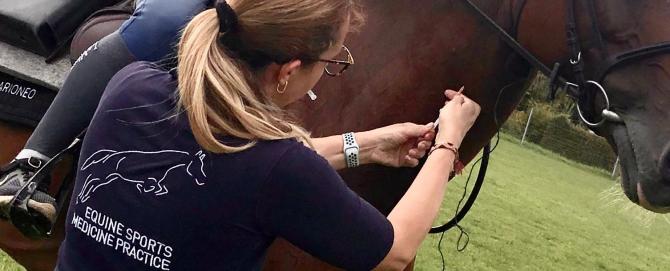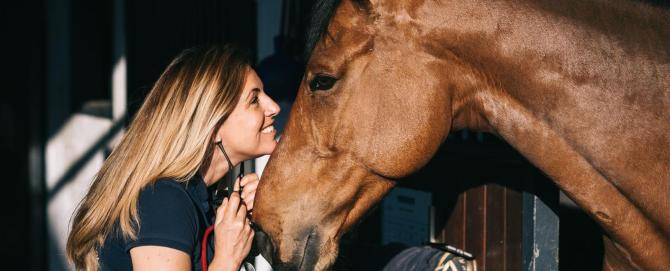
Do you know...Emmanuelle van Erk?
Dr. Emmanuelle van Erck-Westergren is a specialist in equine internal medicine and sports medicine, holding diplomate status with both the European College of Equine Internal Medicine (ECEIM) and the European College of Veterinary Sports Medicine and Rehabilitation (ECVSMR). She obtained her DVM from the Veterinary School of Alfort in France in 1996 and earned a PhD in equine respiratory diseases from the University of Liège. She founded the Equine Sports Medicine Practice (ESMP) in Belgium, specialising in performance diagnostics and sports medicine. She works extensively with elite sport horses and international equestrian teams. She contributes as an expert for the FEI and is the President of the Belgian Equine Practitioners Society (BEPS). Emmanuelle continues to contribute to research through scientific publications and lectures at international veterinary conferences. She is an author and co-editor of the 3rd edition of Equine Sports Medicine and Surgery.

When did you start to have an interest in equine sports medicine?
I have always loved horses and competed in eventing as a kid. But an externship at the department of sports medicine at Cornell University during my second year of vet school was my true epiphany! Watching Dr Norm Ducharme and his team of dedicated researchers trying to elucidate the physiology of a racehorse running at maximal speed on a treadmill was incredibly inspiring. That really hit the spot!
How many people work in your practice?
We are now 4 vets, 2 technicians and 2 office managers. It’s a small but extraordinary team.
What are your main areas of research?
We try to progress with each horse we see, so documenting cases is a precious resource to support our research. Our team has recently published a paper on the link between gastric lesions and the way horses manifest pain during ridden work (RpHE) and how it can be mitigated through dietary adaptations. This has of course raised our interest in some of the risk factors for glandular disease and IBD in particular: this will be our next research focus.
We are also currently working on a large-scale project investigating the effect of cardiac arrhythmias on race performance and their possible association with EIPH.

What research ideas do you have in mind for the future?
The development of onboard, telemetry technology is revolutionizing the way we can follow horses: it gives us insight when we cannot be physically present with the horse and is valuable to recognise changes over time. I think AI will also help us do giant leaps in understanding how the horse behaves, both from an ethological and physiological perspective.
Currently, you are one of the few specialists working exclusively in sports medicine. You continue publishing and conducting research, and you have a wonderful family. How do you manage to balance your personal and professional life so successfully?
My family is my balance, and my husband has always been there to support my career. We have made choices together and I would not have been able to do all this without him. I am passionate about what I do and feeding this passion brings me great joy and satisfaction. I wake up happy when I know I am going to be with horses during the day or read more science!
With time, I have also learnt to recognise when my limits are close to being reached and when a break is needed.
To try to stay fit, I have picked up boxing this year, it’s a great way to get all the week’s tension out. But doing nothing is a talent I am also trying to cultivate, it is essential to nurture peace and creativity.
What advice do you have for new diplomates with an interest in research within Equine Sports Medicine?
You have to love and follow the sport! If you cannot attend all competitions, social media is a great way to stay updated with all your horses’ achievements. The horses you get to see in Equine Sports Medicine are more often athletes that require long-term preventative care to stay healthy rather than sick patients that require treatment. I find it fascinating to be able to support their performance throughout a season or a career, understanding what their limiting factors are, and what could have gone wrong when they did not perform to expectations. It requires building a relationship of trust with the owner and rider using a mutually comprehensible language; you must be able to honestly discuss the rider’s performance and future objectives for the horse.

What are your favorite foods, colours, hobbies, and pets?
Being Belgian, I could live off chocolates… I love all forms of art and enjoy drawing, going to the museum or an art exhibition, to a dance or theatre performance.
I lost my Jack Russell, Giulia last year and it really broke my heart. I am not quite ready to have a new pet yet, but I am surrounded by animals – and not just the furry ones.